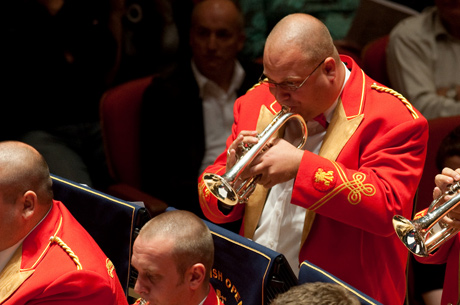2009 British Open Championships - An American in Brum
15-Sep-20094BR asked a real American brass band lover to give us opinions on the British Open, and Bryan Appleby-Wineberg, DMA, was impressed...

An American in Brum: Bryan Appleby - Wineberg Esq
Picture: Ian Clowes
For more pictures of the 2009 British Open:
http://www.pbase.com/troonly/090911_birmingham_open
First let me say a warm ‘thank you’ to 4BR for asking me to write this ‘American Perspective’ of the 2009 British Open.
To Iwan and Anthony and the rest of the gang, their hospitality was wonderful, unexpected and extremely appreciated. They were great company to be around for my first week in the UK, and it is an honour to be asked to write on 4BR.
Wow!
My wife told me that I should come up with something other than “Wow!” and then stunned silence to describe what I heard at Birmingham this weekend.
From my perspective, the standard of playing across the board was staggering. To be quite honest it has been very hard to take it all in. You all are clearly playing a different game than we are in the US.
I’m on sabbatical, for the 2009/2010 academic year, from my position as Associate Professor of Trumpet and Brass at Rowan University (near Philadelphia in Southern New Jersey), will be in the UK for 10 months, and only arrived in the UK just over a week ago.
The past 7 days, I have been able to hear almost all of the Brighouse & Rastrick rehearsals with Professor David King (I will start playing with them this week, and will spend the next five months learning how this all works), and going into the competition I felt like I knew the test piece, ‘Titan’s Progress’.
Banding heaven
Last weekend I was able to attend the Brass Festival in Manchester and on Sunday enjoyed the Gala Concert in Birmingham. Who could ask for a more fitting start to my brass band sabbatical? Am I in brass heaven?
The format of the British Open is unlike the few contests I have played in the US.
The single 17 minute test piece ‘all or nothing’ format seems daunting. That most of the top bands spend only about 2 weeks putting it all together to this level just makes me shake my head in disbelief. In the States we have been known to spend many, many, many, months working on our test and choice pieces.
Even after hearing the contest and the results, I am still having serious trouble putting it all into words. The performances were just amazing. It took me several bands before my ears started searching for smaller and smaller differences in order to be able to do my own ranking.

Small difference, big gestures: Jason Katsikaris leads Leyland
Picture: Ian Clowes
Small differences
As the judges stated, the differences in the top bands was very small.
In my mind it actually seems that the differences in the final rank really come down to taste. I was able to pick out the same top six bands as those guys ‘in the box’, but not in their order. I did indeed think Brighouse should have placed higher than fifth, but my ears have been in a state of excited shock for 10 days now.
As I listened from just above the stage I couldn’t help but think, “…My God, every one of these bands is to a level I have rarely heard”.
I suppose this is really the reason for the sabbatical. You come to the UK to be where the best brass bands compete, and what I heard at the Open has proved it. I don’ think my ears or expectations for my band, my colleagues, myself, or my students will ever be the same.
Contest day
I started my contest day by going over to hear Brighouse do their final prep with David King. The group sounded great and were calm, focused and relaxed.
The MD was rough on them during the week (and I heard the week before as well!) but they seemed relaxed on Saturday and so did he. It was almost as if he had purposefully made the rehearsals difficult and emotionally taxing, so the contest and would seem easy by comparison.
At least two players with major parts said they felt very relaxed on stage. In fact I noticed that both of them played beautifully, not knocking over a single audible note.
I’ll get to my impressions of individual performances, but here are some over all impressions.
The dynamic and colour contrasts of each band are of the level I have only dreamt about. Extreme gesture seemed to be normal and expected. But further, there was wonderful clarity and movement within those large gestures.

Top sop: Bert van Theinen does his stuff with Cory
Picture: Ian Clowes
Soprano playing
The level of soprano playing was striking in two regards: one that so many players sound so great and second that such a demanding part (the subject of recent 4BR commentary I hear) seemed so easy for so many of them.
Of course I had expected the pitch and rhythm to be excellent as a starting point but the sheer clarity of the ensembles was surprising. On the loud side of the dynamics, I felt pressed into my set time and time again by the sheer beauty and weight of the groups as they opened up the volume. Band after band had such a massive and warm sound.
For my ears, just the regular mf chorale sound each band made was striking in that they were so similar. The first choral entrance with four semi-quavers in the baritones and euphs was beautiful. No exceptions.
Some had a more even crescendo, some stretched the time, a couple played a bit too loud, but all were balanced, in tune, and together. This basic understanding of what a beautiful warm choral brass band sound is should not be taken for granted.
You all just do it without thinking, but for those of us trying to teach it and build it, the beauty you all put forward was a pleasure to behold.
Excellence
Now I do believe we can all agree that when we hear real excellence we know it, and like wise when we hear an ensemble that just isn’t up to the standard that has been set we understand they are not really in the running.
These groups had a few missed notes, an unclear Fugue section, a couple of out of tune octaves, or not enough soft dynamic contrast, but I don’t believe for a minute you can say anyone was just bad.
OK, there were a couple of groups that were clearly not up to the standard of the top five or six, but from my perspective they were still great bands and wonderful performances.
For example, my band back home would be honoured to ever be good enough to be compared favourably with Mr. Mead and Whitburn who came in 17th!
Louder and louder
Further, I think it important to mention in this outsiders perspective, that in the afternoon there did seem to be a stretch where groups were trying to play louder and louder, often going over what I believed may be the line of good taste - and I couldn’t help but think the judges may feel the same way.
Might one of the contest tricks be for the later bands to take a bit off the edge? Seems a delicate tightrope to walk - after all, you don’t know what your draw is going to be and I would suspect you can’t really be changing things on the fly just to accommodate your draw.
I somehow missed out on the Leylend and Grimethorpe level of excellence though I did hear their performances.
I wrote in my notes that Grimethorpe seemed a bit over the top but that they gave a polished performance. For Leylend (who played 13th), maybe my aural endurance just wasn’t up to the task?
I wrote “very good” but also, “vibraphone not with the band” and “xylophone beat the cornets to the end of their lick by a wide margin”.
Standing out
The performances that stood out for me were Cory, Dyke, and Brighouse.
For Cory I wrote “maybe the cleanest so far”. Two bands later for Brighouse I wrote “Lots of style” and “very controlled”. To be honest I liked B&R a bit more in terms of inflection.
I agreed with the judges when they said over all, the Farandole section didn’t really come off with the right feel. I really believe it needed to be 3+3+2 (which B&R did).
When Dyke played I thought the performance was outstanding and maybe a bit more confident top to bottom than the other ensembles. I texted my MD back in the States that I thought Dyke had won. In my “first time viewing” set of ears, the top five bands could have been interchanged without much trouble.
Back home
That said, I have not had much success deciding where bands should be ranked in our NABBA Championships either.
Recently my band was beaten (by more then 10 points) by a band that made an ensemble sound I would never tolerate. Again, maybe I’m learning that the ultimate decision comes down to the judges taste.
In addition I noticed a very different perception of the test piece when I closed my eyes. As audience members we may do well to try and listen to each band with our eyes closed so our ears are even more attentive.
Tradition
On Sunday I was again reminded that in the UK you have an extremely long tradition of great brass bands. In the US we are really trying to learn it backwards. My MD calls it “trying some reverse engineering”. I agree.
Seeing that history on display with the Mortimer’s and other stage guests, and talking with former players from some of the bands, was a strong reminder that in the US we are really just starting to understand what this is all about.
To develop my chops and understanding, this past week I was also able to sit in with Lindley Band which is only a 5 minute walk from my flat. After rehearsal and over a pint, some of the players explained the source of your brass band ethic as this: “From our earliest band experiences, it was drilled into us that you don’t miss band”.
Funeral
The Lindley folk also relayed to me the joke about the funeral procession passing a brass band that was playing a concert in a park.
The principal cornet stands up as the coffin goes by, takes off his hat and says “Aye, she was a fine wife”, sits back down and continues to play.
In the States we have no such joke. We would be better served to learn there is no magic water or pill or secret. The reality is dedication, tradition, focus, and effort.
Folks like Steve Wilkinson (principal cornet with B&R) and Joseph Cook (Eb tuba from Dyke) drive more than 200 miles round trip to each rehearsal. The sheer level of dedication to brass banding and great brass playing is just remarkable.
Nothing compares to this
My students have absolutely nothing in their musical experiences that compares to this and neither do I. I expect that over the course of the next 10-months I’ll come to understand through immersion what it all means and maybe then I’ll be able to really put it into perspective.
In closing, thank you so much for such a stunning start to my sabbatical in the UK, feel free to write me at applebywineberg@rowan.edu, and I am looking forward to hearing you play and learning from you for the rest of the year.
Cheers,
Bryan Appleby-Wineberg, DMA
An American in Lindley
Associate Professor of Trumpet and Brass
Rowan University
Co-Principal Cornet
The Atlantic Brass Band















